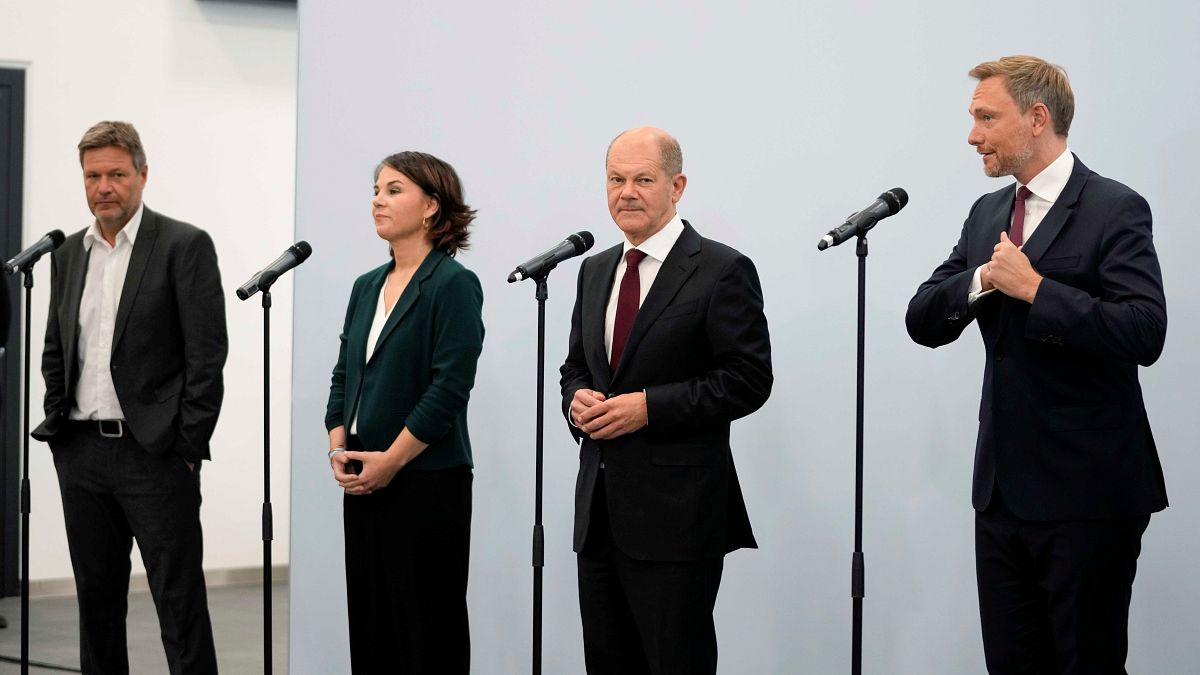The centre-left Social Democrats have been negotiating with the Green party and the pro-business Free Democrats since narrowly winning a national election in September.
Germany's prospective three-party coalition will today present the deal they hope will propel them into government.
Talks on an agreement have been ongoing between the Greens, the pro-business Free Democrats and the Social Democrats following elections in September.
If approved by party members in the coming weeks, the unprecedented three-way "traffic light" alliance would replace the current coalition of Social Democrats and outgoing Chancellor Angela Merkel’s Christian Democrats.
Merkel, who didn't run for a fifth term, is likely to be succeeded as chancellor by current finance minister Olaf Scholz of the Social Democrats.
Few details have emerged from the closed-doors talks, including how the parties will divide up the ministerial portfolios.
A preliminary agreement last month indicated that Germany would bring forward its deadline for ending the use of coal-fueled power from 2038 to 2030, while expanding the rollout of renewable energy generation.
At the Free Democrats’ insistence, the prospective partners said they won’t raise taxes or loosen curbs on running up debt, making financing a central issue.
Merkel's centre-right Christian Democrats are currently preoccupied with a leadership contest over who will become their next leader and revive the party's fortunes after it suffered its worst-ever election result.
Germany facing grim milestone
Amid the political wranglings, Germany is facing a COVID-19 crisis, with the country set to mark 100,000 deaths from the illness this week.
The election, and a drawn-out government transition, has seen politicians push to lift restrictions even as the infection rate in the country grew this autumn.
"Nobody had the guts to take the lead and announce unpopular measures," said Professor Uwe Janssens, who heads the intensive care department at St Antonius hospital in Eschweiler, west of Cologne.
"This lack of leadership is the reason we are here now," he said.
Doctors like Janssens are bracing for a new influx of coronavirus patients as confirmed cases hit new daily highs, fuelled in part by vaccine scepticism.
Resistance to getting the shot - including the one developed by German company BioNTech together with its US partner Pfizer - remains strong among a sizeable minority of people.
Vaccination rates have stalled at 68% of the population, far short of the 75% or higher that the government had aimed for.
Some German politicians are suggesting it's time to consider compulsory vaccination, either for specific professions or for the population as a whole.
Austria took that step last week, announcing that COVID-19 shots will become compulsory for everyone from February.
Germany's outgoing Chancellor Angela Merkel said in June that she didn't favour such a measure.
Signalling a possible shift in position, Merkel summoned leaders from the three parties negotiating to form the next government for talks on Tuesday to discuss the pandemic situation.
Olaf Scholz has so far refused to be drawn on whether he would back compulsory COVID-19 shots.
